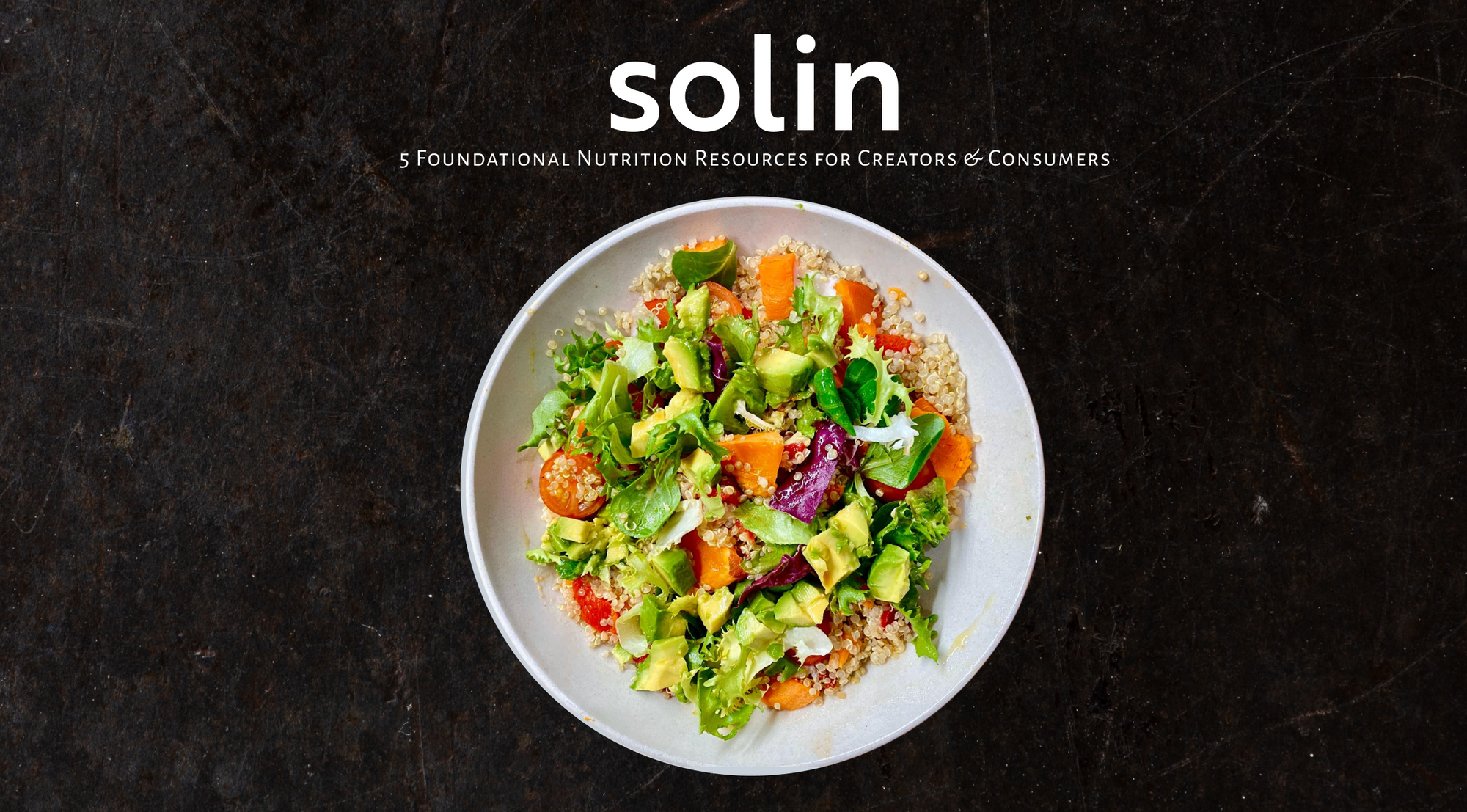5 Foundational Nutrition Resources for Creators & Consumers

One thing we really nerd out on over here at team Solin is going deep in research on any topics we’re working on with our creator partners.
As a digital products partner & platform, it’s our job to add value to all the creators we partner with and make their digital products better. Not only is this crucial for the creators we work with, but it also allows us to provide more value to the consumers that purchase these digital products and engage in creator communities.
Recently, we’ve been designing and launching lots of cookbooks, so we made it a priority to pull together resources that would help enhance these cookbooks. We started by curating in-house recipe options with photos as well as a list of research and science-backed data that we can offer creators as additions to any cookbooks we launch.
In addition to the recipes, we’ve now compiled hundreds of sources to add to creators' digital products and wanted to share 5 of our favorite foundational resources here.
Whether you’re a creator or a consumer, we hope you can utilize these resources to your advantage to level up your education and improve the way you feel on a daily basis!
Note: many of our top sources and derived from Dr. Andrew Huberman, a Professor of Neurobiology at Stanford, given the incredibly thorough nature of his work. He takes a science-based approach, communicates clearly, and brings on highly informative guests, who contribute additional expertise. You can check out his website here: https://hubermanlab.com/
Resource 1: Dr. Andrew Huberman on Nutrients for Brain Health & Performance
In this podcast, Dr. Andrew Huberman discusses the importance of nutrients for optimizing cognition, brain health, and general performance. This is a fantastic foundational masterclass on the effects of certain nutrients & foods on your mind & body. We recommend it as a starting point for anybody trying to understand nutrition and food choice at the foundational level and beyond. One of the most interesting things Dr. Huberman discusses is how you can drive your brain to appreciate specific tastes (or healthy foods). The direct link to that portion of the podcast is here and the link to the entire podcast can be found below.
Resource 2: Dr. Layne Norton on The Importance of Protein
In this podcast with Dr. Andrew Huberman, Dr. Layne Norton discusses the importance of protein for maintaining muscle mass as well as accumulating muscle mass. This clip beginning at 1:37:31 is part of a broader masterclass-type podcast spanning a wide range of topics. You can listen for about 18 minutes to 1:55:38 to learn about things like protein intake, the optimal timing of protein consumption, and much more. Spoiler: it’s much more important to hit your total daily goals for protein than to worry so much about the timing and distribution of your protein intake. The entire podcast is titled: The Science of Eating For Health, Fat Loss, & Lean Muscle and is absolutely worth a listen when you have the time!
In addition to the podcast linked above, Dr. Peter Attia backs up these claims about the importance of protein in this short clip as well. There are plenty of other sources highlighting the importance of protein, but these are a two of our favorites.
Resource 3: General Importance of Healthy Eating & Whole Foods for Improving Gut Microbiome
This is a great foundational resource highlighting 6 things you can do to improve your gut microbiome. Now you may be asking why gut health is important. Gut health plays a critical role in reducing or increasing chronic inflammation in the body. When gut health is poor, you will generally see higher levels of inflammation in the body. And when gut health is good, you will generally see lower levels of inflammation in the body (all else equal). Chronic inflammation is associated with higher levels of mortality, more difficulty losing fat, and more difficulty putting on muscle. In the article below, Dr. Huberman discusses the following 6 things you can do to improve your gut microbiome (note: these are taken directly from his article, which you can find here):
1. Eat fermented foods
2. Consume prebiotics and probiotics (optimal levels of consumption may vary)
3. Get quality sleep
4. Avoid processed foods
5. Limit artificial sweeteners
6. Don’t over-sanitize your environment
Resource 4: Gut Health Masterclass
Speaking of gut health and going even deeper, Rich Roll did a great masterclass on gut health. One of the most enlightening segments was the segment with Dr. Rhonda Patrick, where they discuss chronic inflammation vs. acute inflammation and its effect on the body. Because roughly 70% of your immune system is in your gut lining, gut health is crucial when it comes to reducing this chronic inflammation. Taking care of your gut can lead to better health outcomes, improved mood, enhanced motivation, and so much more.
The podcast below from 44:10 – 1:03:50 is transformational when it comes to your understanding of gut health and its effects on your body & brain. Here is the link directly to 44:10.
Resource 5: Fiber (Harvard Health)
Lastly, we’ll move into the world of fiber. Considering 97% of the United States is fiber deficient, this seems like another topic area nearly all of us can benefit from paying more attention to. This fiber primer from Harvard Health does a great job defining fiber, helping us understand its impact on health, and explaining how we can get more of it in our diets. Spoiler: according to Harvard Health, “Fiber appears to lower the risk of developing various conditions, including heart disease, diabetes, diverticular disease, and constipation. Fiber’s beneficial role in the gut microbiome may produce anti-inflammatory effects that alleviate the chronic inflammation associated with these conditions.”
This wraps up our summary on 5 of the most foundational nutrition resources that can help you level up your knowledge of nutrition & healthy eating. You can find more detailed breakdowns and additional resources in many of the programs & products on Solin, and you can always feel free to email support@solinfitness.com if you have specific questions on which resources are best for you depending on your goals.
How to Get in Touch
If you’re a creator and you’d be interested in working with our team, please feel free to apply here: https://solin.stream/creators (use referral code NUTRITION for an expedited review).
As always, if you have any questions or would like to get in touch more generally — feel free to reach us at creators@solinfitness.com. We’d love to hear from you!
